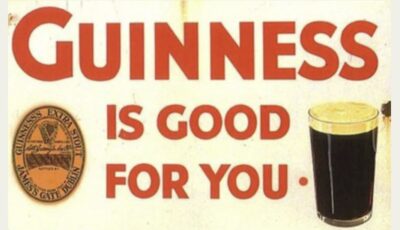If Guinness beer has become so famous over the centuries, it’s not only thanks to the qualities of its stout, but also to the brewery’s relentless talent for marketing communications! Whether with its harp, its toucan or its powerful messages, the Irish establishment has always been able to communicate brilliantly, to better sell its beer.
And the slogan“Guinness is good for you” is a perfect example. Simple, effective… this phrase is familiar to most Irish people… but also to beer drinkers in the rest of the world!
But what does it really mean? What is the origin of this slogan, and what is the meaning behind these simple words? Is this statement medically true?
Explanations.

Guinness is good for you
The story of “Guinnes is good for you” goes back to the beginning of the 20th century.
By this time, the Guinness brewery had already been on a roll for several centuries, and its managers wanted to expand their sales with increasingly aggressive communications.
At a time when advertising is booming, the brewery wants to keep things simple. She’s looking for a “punchy” formula: a phrase capable of getting into people’s minds, and staying there!
So, after countless meetings, a survey was launched in Ireland in 1920, asking consumers how they viewed stout. After several months of study, the verdict came as a surprise: a majority of those surveyed said they felt in better shape after drinking a pint of Guinness!
It’s a feeling that has given the brewery’s managers an idea: from now on, it’s all about the benefits of beer!
The slogan “Guinness is good for you” was born.

Have a Guinness when you’re tired
The first official use of the slogan is thought to date back to 1929. You’ll find it plastered everywhere on posters in bright red lettering, featuring pints of Guinness, with the words: “A Guinness a day… Guinness is good for you“.
The message is that a Guinness a day is good for your health!
To reinforce this idea, the campaign is backed up by two other slogans in the same vein:
Most of the posters depict a toucan, a turtle or a horse: a bias asserted by the company’s managers, who want to stand out from the competition at all costs, and reinforce the brand’s sense of humor and appeal.

The Guinness toucan
While this message may be controversial today, it was not so when it was released in the late 1920s. At that time, Irish society’s relationship with alcohol was very different.
Guinness, for example, wanted an advertising campaign without vulgarity, and intended to promote the supposed nutritional properties of its beer, describing it almost as an elixir capable of restoring strength, vitality and well-being to its consumers.
An effective sales pitch that has considerably boosted sales of dark beer!
And so, over the years, the slogan came to be taken for granted, becoming a quasi-truth in its own right (an assertion now taken with more distance, see the scientific analysis below).
Many Irish people were convinced that Guinness was good for you!
So much so, that Guinness was often recommended as a tonic for people convalescing or lacking energy. Its iron content, in particular, made it a popular drink among Irish workers and pregnant women! (Yes, yes, you read that right!).
Fortunately, society’s attitude to alcohol has changed over the decades. Over time, and thanks to our efforts to raise awareness, alcohol has become a serious public health issue, requiring better supervision.
Many breweries and distilleries have been forced to rethink and change their communications strategy. No more injunctions encouraging the public to consume alcohol, supposedly in the name of their health! We were going to have to tone things down, and steer clear of this type of argument… at the risk of criminal sanctions!
Guinness was no exception. Thus, the phrase “Guinness is good for you” has evolved to meet changing health standards and concerns.
In response, the Irish brewery has changed its advertising strategy to emphasize moderation and responsible enjoyment. It has made its slogan less literal and more focused on the beer-tasting experience, while retaining a certain nostalgia for its past.
Guinness, for example, has achieved the feat of keeping its slogan unchanged, but changing the way it is perceived.
Since then, the slogan “Guinness is good for you” has been taken with humor and more distance. A statement to be taken with a grain of salt, which absolves itself of any medical claims!

A pint of Guinness – © Mountain Ash Studio
To claim that an alcohol-based beverage is medically beneficial would be irresponsible. This would pose a public health problem on a massive scale!
Nevertheless, science has looked into the case of a pint of Guinness, to determine whether it possesses any virtues in its own right. And the verdict is clear: with the exception of the alcohol content, this “made in Ireland” beverage has real nutritional properties.
It’s a real concentrate of antioxidants, folic acid, soluble fibre, yeast and probiotics… and even contains silicon! Light in weight, it’s even one of the lowest-calorie beers in its category, dispelling the myth that beer can replace a meal if it’s fattening and filling!
These qualities are thought to help balance the intestinal flora and limit the presence of oxidants in the body.
However, scientific analysis has revealed another misconception: Guinness is far less rich in iron than popular belief would have us believe! It is estimated that a pint of Guinness contains just 0.3 milligrams of iron, less than 3% of the recommended daily intake for an adult!
Forget the idea that Guinness is a tonic: there’s nothing exceptional about its iron content!
With hindsight, the slogan “Guinness is good for you” is indicative of a very particular era, when alcohol was not regarded with the same vigilance as it is today.
However, a pint of stout turns out to be a clever blend of health-promoting nutritional elements… with the exception of its alcohol.
Guinness’ historic slogan should be taken with a grain of salt. Like anything else, it can be beneficial to a certain extent… as long as you remember that it’s an alcoholic beer! Drink in moderation, then: advertising is only ever advertising, and even the Diageo group, which now owns the brewery, communicates the need to consume alcohol in moderation!